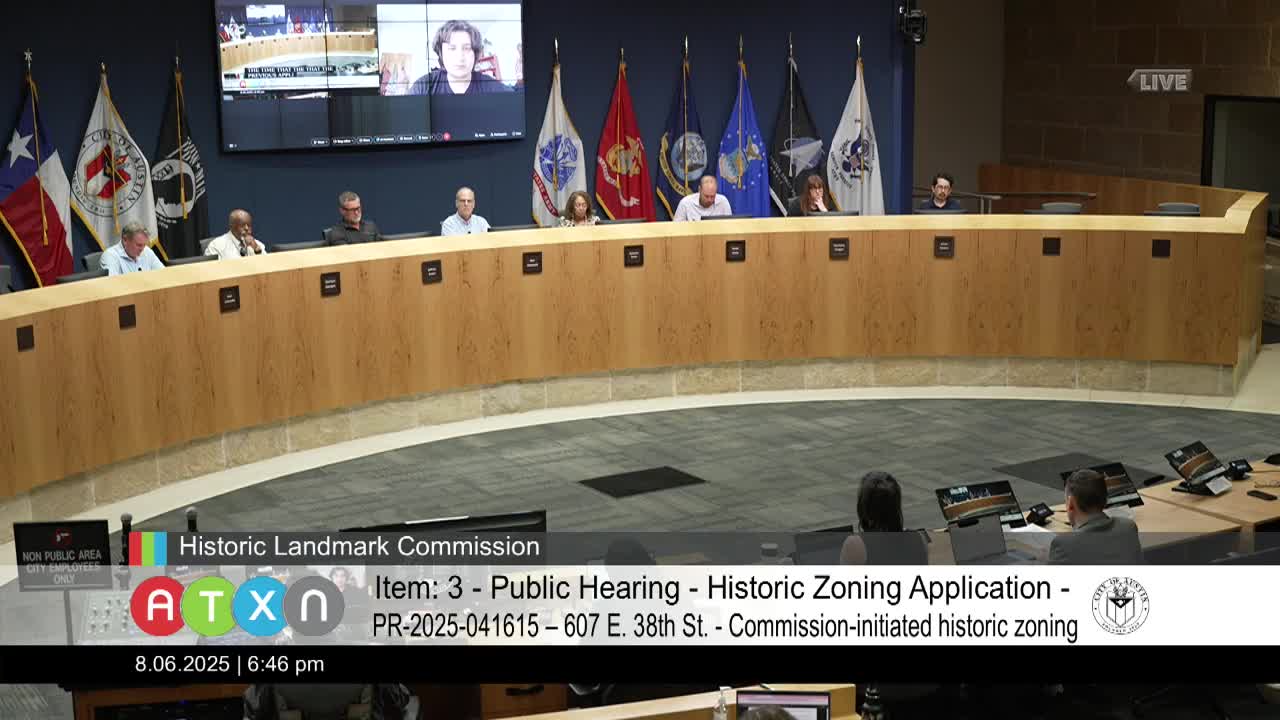Commission Approves Postponement for Historic Zoning Case in Local Neighborhood
August 06, 2025 | Austin, Travis County, Texas
This article was created by AI summarizing key points discussed. AI makes mistakes, so for full details and context, please refer to the video of the full meeting. Please report any errors so we can fix them. Report an error »

In a recent government meeting held on August 6, 2025, the Austin Historic Landmark Commission engaged in significant discussions regarding the potential historic zoning of a property in Austin, Travis County. The meeting highlighted the complexities surrounding the preservation of historic homes amid community concerns and the need for further dialogue.
The primary focus of the meeting was a property that had not been occupied for three years and had previously received a demolition permit in 2022. Commissioners raised questions about whether this was the only house in the area being considered for historic designation, noting that other homes in the vicinity appeared similar. This led to a broader discussion about the implications of designating multiple properties as historic, which could affect the entire neighborhood.
The owner of the property expressed a willingness to collaborate with neighbors to ensure that any new design would blend harmoniously with the existing architecture. This openness to dialogue was met with appreciation from the commission, as it indicated a potential path forward that could address community concerns while respecting the owner’s intentions.
As the meeting progressed, it became clear that time constraints were a pressing issue. The commission was informed that this was the last opportunity to address the matter before it moved to the planning commission and subsequently to the city council. Several commissioners expressed a desire for additional documentation and structural reports before making a decision.
In a notable turn of events, the owner agreed to request a postponement of the decision, allowing for more time to gather necessary information and engage in further discussions with the community. This postponement was unanimously approved by the commission, reflecting a collective commitment to ensuring that all parties involved could participate in the decision-making process.
The meeting concluded with a call for the owner to attend an upcoming architectural review committee meeting, emphasizing the importance of continued dialogue and collaboration. This approach not only aims to preserve the historical integrity of the neighborhood but also fosters a sense of community involvement in the preservation process.
Overall, the discussions during this meeting underscore the delicate balance between development and preservation in Austin, highlighting the importance of community engagement in shaping the future of historic neighborhoods. The commission's decision to postpone reflects a thoughtful approach to addressing the complexities of historic zoning, ensuring that all voices are heard before moving forward.
The primary focus of the meeting was a property that had not been occupied for three years and had previously received a demolition permit in 2022. Commissioners raised questions about whether this was the only house in the area being considered for historic designation, noting that other homes in the vicinity appeared similar. This led to a broader discussion about the implications of designating multiple properties as historic, which could affect the entire neighborhood.
The owner of the property expressed a willingness to collaborate with neighbors to ensure that any new design would blend harmoniously with the existing architecture. This openness to dialogue was met with appreciation from the commission, as it indicated a potential path forward that could address community concerns while respecting the owner’s intentions.
As the meeting progressed, it became clear that time constraints were a pressing issue. The commission was informed that this was the last opportunity to address the matter before it moved to the planning commission and subsequently to the city council. Several commissioners expressed a desire for additional documentation and structural reports before making a decision.
In a notable turn of events, the owner agreed to request a postponement of the decision, allowing for more time to gather necessary information and engage in further discussions with the community. This postponement was unanimously approved by the commission, reflecting a collective commitment to ensuring that all parties involved could participate in the decision-making process.
The meeting concluded with a call for the owner to attend an upcoming architectural review committee meeting, emphasizing the importance of continued dialogue and collaboration. This approach not only aims to preserve the historical integrity of the neighborhood but also fosters a sense of community involvement in the preservation process.
Overall, the discussions during this meeting underscore the delicate balance between development and preservation in Austin, highlighting the importance of community engagement in shaping the future of historic neighborhoods. The commission's decision to postpone reflects a thoughtful approach to addressing the complexities of historic zoning, ensuring that all voices are heard before moving forward.
View full meeting
This article is based on a recent meeting—watch the full video and explore the complete transcript for deeper insights into the discussion.
View full meeting
